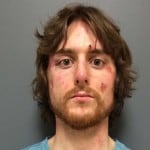There is little doubt re-watching video of Justin Bourque chillingly describe the targeted killing of their husbands, sons, fathers — “It’s sad,” Bourque explains blandly. “They might have had a wife and kids, but every soldier has a wife and kids, right?… It’s all about whose side you chose, and they chose the wrong one” — will “re-traumatize” the families of the three RCMP officers Bourque murdered last June.
It’s equally likely the three-hour video, not to mention photos of bloodied Mounties and disturbing audio of radio transmissions, will soon find their way into the farthest, darkest corners of the Internet. That will give Bourque and his own twisted, ultimately renounced rationale — he initially told investigators he believed be was launching a rebellion against an oppressive government, but confessed at his sentencing his words were those of “an arrogant pissant” — “a voice in perpetuity.”
Crown and defence lawyers marshalled those potential “personal” consequences to attempt to convince New Brunswick Chief Justice David Smith to keep some key evidence out of the public domain, even though it had already been presented in open court.
“There is a legitimate public interest in getting as much information we possibly can,” countered media lawyer David Coles. “You have a bloodbath here. Are our security forces properly trained?”
On Friday, Smith ordered the materials released. “The open court principle is important,” he wrote, “in that it allows the public to go behind court decisions to see what further determined or influenced its decision; in other words, why the court decided what it did.”
The same principle should apply to releasing evidence in the case of Michael Zehaf-Bibeau, the man who killed a soldier during the October attack on Parliament Hill. Even though there will be no trial — Zahef-Bibeau was killed during the assault — there is security footage video of the attack inside the Centre Block as well as Zahef-Bibeau’s own videotaped explanation of why he did what he did.
Was Zahef-Bibeau a terrorist, or mentally ill, or both? What can we learn from the security footage to better protect our national institutions?
The RCMP and the Speaker of the House of Commons now say that evidence may never be released.
Canadians deserve better. We need accountability.




 STEPHEN KIMBER, a Professor of Journalism at the University of King's College in Halifax and co-founder of its MFA in Creative Nonfiction Program, is an award-winning writer, editor and broadcaster. He is the author of two novels and eight non-fiction books. Buy his books
STEPHEN KIMBER, a Professor of Journalism at the University of King's College in Halifax and co-founder of its MFA in Creative Nonfiction Program, is an award-winning writer, editor and broadcaster. He is the author of two novels and eight non-fiction books. Buy his books